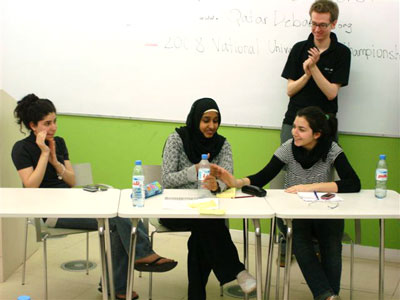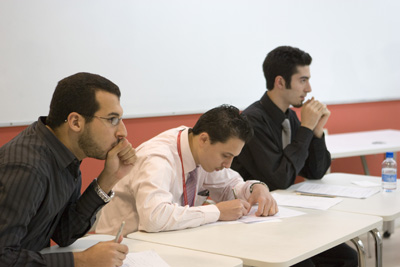WCMC-Q pre-meds carry off national debating trophy
March,2008

Qatar National Universities' Debate Champions: Nadine Saad,
Rahima Sanya and Marwa Saleh with a QatarDebate coach
With topics on the table ranging from Doha's 2016 Olympic bid, to human cloning, to a manned mission to Mars, WCMC-Q's students - from foundation to second year medics - have explored some of the hottest issues of the day in a series of debates this spring.
On March 14, pre-meds Nadine Saad, Rahima Sanya and Marwa Saleh went head-to-head with med students Anas Abou-Ismail, Anas Ahmad and Adam Khader to debate the Motion "This House believes the government should never censor political comment" in the final of the QatarDebate National Universities' Debating Competition 2008, held in Education City.
Speaking for the Motion, the women's team narrowly defeated the men, in a competition judged by visiting members of the Oxford Debating Union according to the criteria of style, content and strategy.
The two teams reached the final following previous encounters in a round robin competition that included teams from Carnegie Mellon University in Qatar, College of the North Atlantic-Qatar, the Academic Bridge Program and CHN-Qatar.
With wide-ranging interests, WCMC-Q's students appear to relish the opportunity to argue a case - even counter-intuitively - on almost any topic under the sun. Given 40 minutes to prepare a position on a Motion they've never seen before, and with no access to information resources, they deconstruct the statement, agree on the team's approach, and plan to ambush their opponents, all in a spirit of free and fair discussion.
"You break down everything into questions, and then try to analyze them using what you already know... You forget what you really believe in and focus on what you're supposed to work with," said Saleh.

Medical students Adam Khader, Anas Ahmed and Anas
Abou-Ismail gave the winning team a good run for their
money, and carried off two awards for individual speakers.
"And you need to predict and outwit your opponents' argument," added Abou-Ismail. "The first speaker explains the Motion briefly, but his main job is to predict what the opposition would say and shatter them." This was his role in the three-person team.
WCMC-Q's students were in part inspired by classroom mini-debates in the pre-med First Year Writing Seminars and Medical Ethics course. They "really caught on," said Dr. Rodney Sharkey, assistant professor of English, and coach and coordinator of WCMC-Q's teams: "There was such a groundswell of desire to have debates - I constantly had students asking me about them."
Part of the wider picture here is the extraordinary influence of the Doha Debates. WCMC-Q students regularly attend the events, and are often ready with questions to the speakers.
Now, QatarDebate - a spin-off from the Doha Debates also under the Qatar Foundation umbrella - is engaging high school and university students as active participants.
The convenor, Rosemary Evans explained: "It focuses the students’ attention on important national and world issues. It's very good training in developing a logical mind, and realizing you should listen to what the opposition is saying and focus your arguments accordingly."
Providing training for faculty and students in procedure, presentation and strategy, is an international team of experienced young debaters led by co-directors of QatarDebate, Alex Just and Andrew Goodman of Oxford University, U.K.
"The WCMC-Q students are very confident in their own abilities. Once we gave them the tools, they adapted very well to the challenge," commented Just, who is a past president of the Oxford Union.
Noting the enthusiastic response to the inaugural competition, he said there was now a "good chance" that Qatar could field teams for the World University Debating Championships to be held in Cork, Ireland in 2009.
Certainly, WCMC-Q's students have the ability and enthusiasm to rise to the challenge.
Report by Sylvia M. Ismail
Photographs courtesy of Doha Debates
